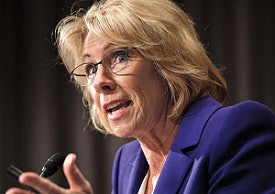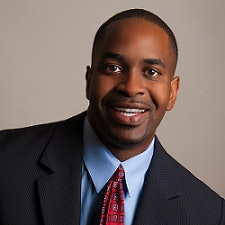Amid new efforts to reinvigorate lethargic federal investigations of for-profit colleges, some academics who study higher education see the issue as a harbinger of wider conflict and change.
 Betsy DeVos
Betsy DeVosNew Jersey Attorney General Gurbir S. Grewal revived the discussion last week by sending a letter to U.S. Secretary of Education Betsy DeVos with a specific request: either renew downsized investigations into fraud at for-profit schools and allow cooperation by states, or turn the probes over to the states.
Grewal – who took office in January along with Democratic Gov. Phil Murphy, who appointed him – appears to be the first state attorney general to issue such a call to the federal government during this time of reckoning for for-profit colleges. His action comes two years after the Obama administration created a special team in the Department of Education to investigate abuses by for-profit post-secondary education providers in the wake of numerous scandals, including the bankruptcy of for-profit behemoth Corinthian Colleges.
Students who attended for-profit schools tend to default on student loans at higher rates, complete degree programs at lower rates and earn lower wages if they do finish. Racial minorities, low-income students and other underrepresented groups have been impacted disproportionately because they are a disproportionate share of the student population at for-profit schools.
Observers note that the DOE’s investigations have slowed down, shrunken and in some cases stopped since the Trump administration took over in January 2016, as the department under DeVos has appeared less inclined to go full-throttle after for-profit schools accused of predatory and fraudulent activities. The team of investigators and lawyers is now significantly smaller and with a narrower scope – basically “processing student loan forgiveness applications and looking at smaller compliance cases,” the New York Times reported May 13.
 Dr. Robert Palmer
Dr. Robert PalmerGrewal, who said the department is no longer cooperating with or responding to New Jersey’s requests to address for-profit college fraud, voices the frustration of many who demand to see for-profit schools that have behaved improperly held fully accountable. He questioned, for example, the status of investigations into various for-profit schools such as DeVry Education Group, which in 2016 settled for $100 million a lawsuit that alleged misleading advertising.
Dr. Robert Palmer, an associate professor in Howard University’s School of Education, said turning the investigations over to the states may not be a good move.
“Obviously, we have a secretary of education who tends to favor for-profit institutions,” he said. “But the investigation should remain under the purview of the Department of Education. Some states may agree with DeVos’ approach, so turning it over to the states probably would be a disservice to students, particularly low-income and minority students, who attend for-profit schools at higher rates.”
Grewal’s stance may foreshadow a rise in consumer protection at the state level, which could lead to tension between the federal and state governments, said Peter Lake, director of the Center for Excellence in Higher Education Law and Policy at Stetson University College of Law in Florida.
“Then you would have a federalism issue about how far [states] can go,” said Lake.
Public interest in consumer protection surrounding transparency and potential fraud grew during the administrations of presidents George W. Bush and Barack Obama and were central in Bernie Sanders’ presidential candidacy in 2016, particularly among young voters disgruntled about crippling student loan debt, Lake said.
 Peter Lake
Peter LakeThen along came DeVos, a champion of school choice with business-friendly policies in other areas of education who has drawn heavy criticism from some quarters. Although she seems to run “one of the least drama-filled” education department compared to some of her predecessors, Lake contended, “her political foes sense that she is vulnerable.”
“There was a lot of concern that the DeVos administration would take the foot off the gas in consumer protection, particularly with for-profit business,” Lake said. “Not a lot has changed in a way that’s permanent, but there’s been a change in the wind with enforcement effort.”
Angst and activism are likely to increase as the hot-button issues of college affordability, accountability and safety converge in the public arena – with ramifications for all colleges, not just the nonprofits, Lake predicted.
“Who’s in charge? How are they setting policies? And how transparent and accountable are they to consumers about their product?” asked Lake. “We’re seeing an uptick in consumer power. Consumers feel part of the narrative and they want to chime in. Politicians will start posturing around the issue, and it has a lot of legs politically and legally. One way or another, for-profit and nonprofit education will be held accountable by consumer interests.”
Those interests, increasingly, are being driven by the needs of adult learners who work, who have families, who want time-flexible and cost-friendly alternatives to the traditional college experience – the enticements that have drawn many to distance learning at for-profit schools.
“Colleges are now thinking more about how they provide access to students,” said Palmer. “There’s distance learning and accelerated programs, sometimes in a hybrid nature so students can still get a quality education at an affordable cost that meets the needs of their lifestyle.”
LaMont Jones, Jr., can be reached at [email protected] You can follow him on Twitter @DrLaMontJones















